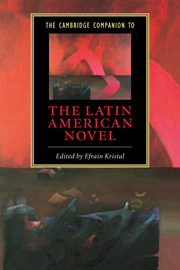6 - The Caribbean novel
from Part II - Heterogeneity
Published online by Cambridge University Press: 28 May 2006
Summary
The Caribbean is defined by its geographic location and its many islands, of which Cuba, Puerto Rico, Hispaniola, which the Dominican Republic and Haiti share, and Jamaica are the largest. The Caribbean, whose name is derived from the Carib Amerindians, was the first point of contact between the Old and New Worlds. During his first voyage, Columbus made landfall in Hispaniola and Cuba, and in his second, in Puerto Rico. As the first and last points of contact between the Old and New Worlds, the Caribbean became a privileged area of transit and cultural exchange between Europe, America, Africa, and Asia.
The Caribbean revealed a different kind of wealth, not of gold and silver, but of fertile lands for planting and harvesting sugarcane, and producing sugar. In fact, this area would be defined by the plantation and sugar-mill systems described so masterfully by Antonio Benítez Rojo and Manuel Moreno Fraginals, respectively. Sugar is labor intensive and, with the advent of slavery, West Coast Africans were robbed from their lands and taken in large numbers to Santo Domingo (Haiti) and Cuba, but also to other islands. If other European powers like Great Britain, France, and Holland challenged Spain for supremacy in the Caribbean, the Spanish Crown was able to set the foundation for the development of culture in Cuba, Puerto Rico, and the Dominican Republic.
The origin of the Caribbean novel in Cuba, Puerto Rico, and the Dominican Republic is associated with the early nineteenth-century movements for independence in Spanish America, and the need to forge a national identity. However, these Caribbean countries obtained their independence many decades after those in Spanish America had gained their freedom from Spain, and with some important differences: the Dominican Republic received its sovereignty in 1844, not from Spain but from Haiti; Cuba and Puerto Rico became independent from Spain, but not until the Spanish American War of 1898.
- Type
- Chapter
- Information
- The Cambridge Companion to the Latin American Novel , pp. 125 - 141Publisher: Cambridge University PressPrint publication year: 2005



